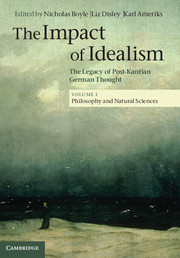Book contents
- Frontmatter
- Contents
- List of Illustrations
- List of Contributors
- Acknowledgements
- List of Abbreviations
- Foreword
- General introduction: the eighteenth and nineteenth centuries
- General introduction: the twentieth and twenty-first centuries
- Introduction: Idealism in the natural sciences and philosophy
- 1 Philosophy of natural science in Idealism and neo-Kantianism
- 2 The impact of German Idealism and Romanticism on biology in the nineteenth century
- 3 The unconscious: transcendental origins, Idealist metaphysics and psychoanalytic metapsychology
- 4 Nietzsche, Kant and teleology
- 5 Transcendental idealism, phenomenology and the metaphysics of intentionality
- 6 Heidegger and the impact of idealism
- 7 French Hegelianism and anti-Hegelianism in the 1960s: Hyppolite, Foucault and Deleuze
- 8 Scottish Idealism
- 9 ‘My station and its duties’: social-role accounts of obligation in Green and Bradley
- 10 Idealism and the origins of analytic philosophy1
- 11 Idealism and Pragmatism: the inheritance of Hegel's concept of experience
- 12 Reason's form
- Bibliography
- Index
- References
2 - The impact of German Idealism and Romanticism on biology in the nineteenth century
Published online by Cambridge University Press: 05 December 2013
- Frontmatter
- Contents
- List of Illustrations
- List of Contributors
- Acknowledgements
- List of Abbreviations
- Foreword
- General introduction: the eighteenth and nineteenth centuries
- General introduction: the twentieth and twenty-first centuries
- Introduction: Idealism in the natural sciences and philosophy
- 1 Philosophy of natural science in Idealism and neo-Kantianism
- 2 The impact of German Idealism and Romanticism on biology in the nineteenth century
- 3 The unconscious: transcendental origins, Idealist metaphysics and psychoanalytic metapsychology
- 4 Nietzsche, Kant and teleology
- 5 Transcendental idealism, phenomenology and the metaphysics of intentionality
- 6 Heidegger and the impact of idealism
- 7 French Hegelianism and anti-Hegelianism in the 1960s: Hyppolite, Foucault and Deleuze
- 8 Scottish Idealism
- 9 ‘My station and its duties’: social-role accounts of obligation in Green and Bradley
- 10 Idealism and the origins of analytic philosophy1
- 11 Idealism and Pragmatism: the inheritance of Hegel's concept of experience
- 12 Reason's form
- Bibliography
- Index
- References
Summary
All art should become science and all science art;
poetry and philosophy should be made one.
Friedrich Schlegel, Kritische Fragmente, 115
Many revolutionary proposals entered the biological disciplines during the late eighteenth and nineteenth centuries, theories that provided the foundations for today's science and gave structure to its various branches. Cell theory, evolutionary theory and genetics achieved their modern form during this earlier time. The period also saw a variety of new, auxiliary hypotheses that supplied necessary supports for the more comprehensive theories. Ideas in morphology, embryology, systematics, language and behaviour began to proliferate. These scientific developments forced a reconceptualisation of nature and the place of human beings therein. The legacy for the twentieth and twenty-first centuries has been a materialisation and mechanisation of the most fundamental processes of life. From our current perspective, it is easy to look back and assume that the foundational ideas of our contemporary science must have had the same character as they now seem to manifest. I think a closer inspection of biological science of this earlier period will reveal a discipline whose philosophic assumptions are quite different from those of its present incarnation. This becomes especially vivid when we focus on the contributions of German Idealism and Romanticism to the biology of the earlier dispensation.
- Type
- Chapter
- Information
- The Impact of IdealismThe Legacy of Post-Kantian German Thought, pp. 105 - 133Publisher: Cambridge University PressPrint publication year: 2013
References
- 3
- Cited by



